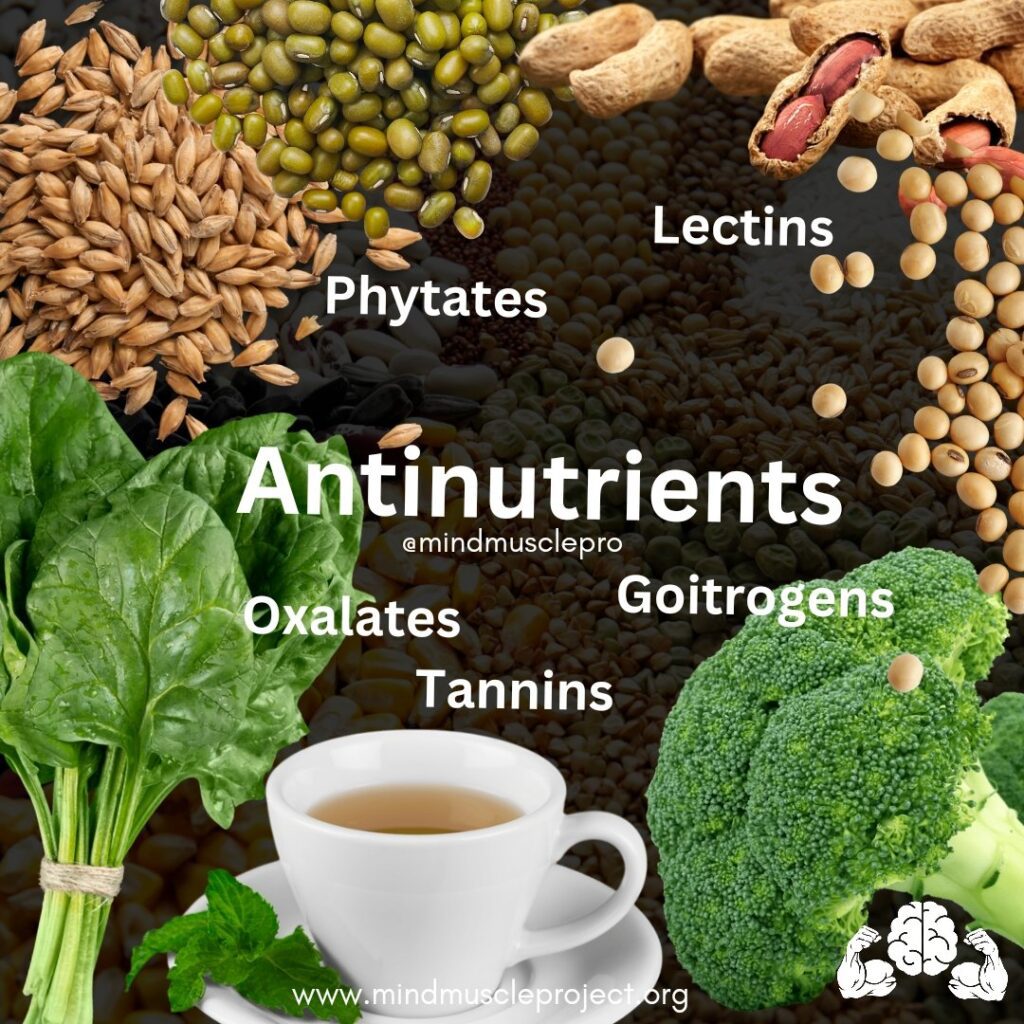Antinutrients are naturally occurring compounds in certain foods that can interfere with digestion and nutrient absorption. While they may sound concerning, they’re actually a part of a plant’s natural defense mechanism, designed to protect them from being eaten by animals or infected by pests.
In this blog post, we’ll explore what antinutrients are, the potential issues they pose, and practical ways to reduce their effects so you can enjoy a balanced, nutrient-rich diet without unnecessary worry.
What Are Antinutrients? #
Antinutrients are compounds found in many plant-based foods, especially in seeds, nuts, grains, and legumes, and to a lesser extent in the leaves and stems of plants. These compounds can impair nutrient absorption or digestion, but not all antinutrients are harmful—some are even neutral or beneficial in certain contexts.
Common Antinutrients and Their Effects #
Here are the most well-known antinutrients and the potential health concerns they may pose:
1. Phytates #
- Found in: Grains, legumes, nuts, and seeds.
- Effects: Bind to minerals like iron, zinc, and calcium, reducing their absorption.
- Concern: Can contribute to mineral deficiencies in diets heavily reliant on these foods.
2. Lectins #
- Found in: Legumes (like beans) and grains.
- Effects: May cause digestive discomfort by interfering with the gut lining.
- Concern: Excess consumption of raw or improperly prepared legumes can lead to gut issues.
3. Oxalates #
- Found in: Spinach, beet greens, rhubarb, and other leafy vegetables.
- Effects: Bind to calcium, forming oxalate crystals, which can contribute to kidney stones in susceptible individuals.
- Concern: High intake may increase the risk of kidney stones for those predisposed.
4. Tannins #
- Found in: Tea, coffee, wine, and some fruits.
- Effects: Can inhibit iron absorption and may cause digestive discomfort in large quantities.
- Concern: Primarily an issue for individuals with iron-deficiency anemia.
5. Saponins #
- Found in: Legumes, quinoa, and some vegetables.
- Effects: May interfere with nutrient absorption or irritate the digestive system.
- Concern: Typically not a major health risk when consumed in moderation.
6. Goitrogens #
- Found in: Cruciferous vegetables like broccoli, cauliflower, and kale.
- Effects: Can interfere with thyroid function by disrupting iodine uptake.
- Concern: Only a concern for individuals with pre-existing thyroid issues.
Should You Worry About Antinutrients? #
For most people, antinutrients do not pose a significant health risk when consumed as part of a balanced diet. However, if you:
- Follow a mostly plant-based diet,
- Have underlying health conditions like autoimmune disorders, or
- Struggle with gut issues or nutrient deficiencies,
…it may be beneficial to reduce the effects of antinutrients using certain preparation methods.
How to Reduce or Neutralize Antinutrients #
Fortunately, traditional food preparation techniques can significantly reduce or neutralize antinutrients, making plant-based foods easier to digest and their nutrients more bioavailable. Here are the most effective methods:
1. Soaking #
- What it Does: Helps deactivate antinutrients like phytates in grains, legumes, and seeds.
- How to Do It: Soak foods in water for several hours (or overnight) before cooking. Adding a little acid (like lemon juice or vinegar) can enhance the process.
2. Sprouting #
- What it Does: Reduces phytates and lectins while increasing nutrient availability.
- How to Do It: Allow grains, seeds, or legumes to germinate by soaking them and keeping them in a warm, moist environment until sprouts appear.
3. Fermenting #
- What it Does: Breaks down antinutrients and enhances beneficial compounds.
- How to Do It: Ferment foods like soy (into miso, tempeh, or natto) or grains (into sourdough) to deactivate antinutrients and improve digestibility.
4. Boiling #
- What it Does: Reduces lectins, tannins, and other antinutrients that can cause digestive discomfort.
- How to Do It: Boil foods like beans, quinoa, and leafy greens thoroughly before consuming.
When to Be Cautious About Antinutrients #
While antinutrients are not a major concern for the average person, it’s worth being mindful in specific situations:
- If you have nutrient deficiencies (e.g., iron, zinc, or calcium), consider preparing foods in ways that reduce antinutrient content.
- If you have thyroid issues, limit raw cruciferous vegetables that contain goitrogens.
- If you experience digestive discomfort, soaking, sprouting, or boiling foods may help.
Final Thoughts: Don’t Fear Antinutrients #
Antinutrients are a natural part of many nutritious foods, and for most people, the benefits of these foods far outweigh any potential downsides. Simple preparation methods like soaking, sprouting, fermenting, and boiling can minimize their effects, making it easy to enjoy plant-based foods without worry.
Rather than eliminating these foods entirely, focus on balance, variety, and proper preparation to support your health and get the most out of your diet.





